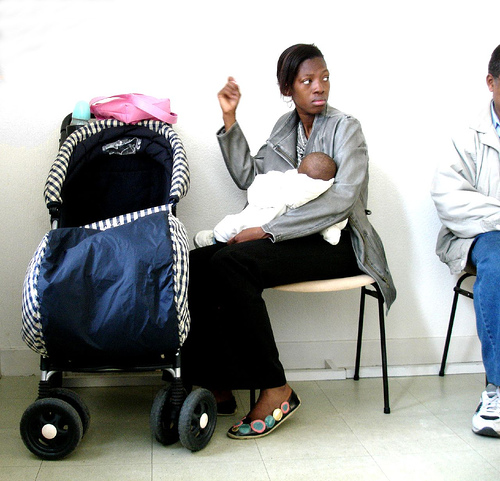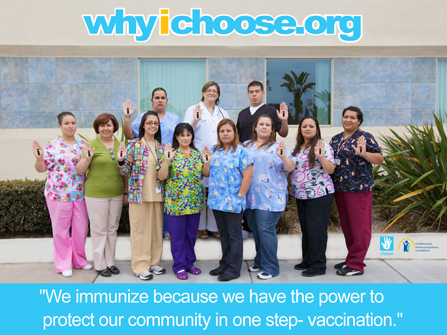Talking About Immunizations Positively and With Purpose
Mar 14, 2014
We often hear the claim that the public is growing increasingly anxious about the safety of childhood vaccinations. We’re even told that this is leading parents to refrain from getting their children immunized. 
But how can do we know this for sure?
Fortunately, in an effort to understand the public’s vaccine perceptions, social scientists are beginning to look at these questions in the same way that we investigate vaccine safety and efficacy. Through research.
Last month an interesting report was released entitled Vaccine Risk Perceptions and Ad Hoc Risk Communication: An Empirical Assessment. It detailed two principal findings:
“First, that vaccine risks are neither a matter of concern for the vast majority of the public nor an issue of contention among recognizable demographic, political, or cultural subgroups; and second, that ad hoc forms of risk communication that assert there is mounting resistance to childhood immunizations themselves pose a risk of creating misimpressions and arousing sensibilities that could culturally polarize the public and diminish motivation to cooperate with universal vaccination programs.”
In other words, the majority of people are not focused on vaccine risks, and by repeatedly stating that there is mounting resistance to vaccines we’re possibly doing more to damage the public’s risk perception than to improve it.
This is an interesting report to consider because it can directly influence the way in which we talk about immunizations. The findings suggest that government agencies, public health professionals, and other constituents of the public health establishment should evaluate their messaging to
(1) promote the use of valid and appropriately focused empirical methods for investigating vaccine-risk perceptions and formulating responsive risk communication strategies; (2) discourage ad hoc risk communication based on impressionistic or psychometrically invalid alternatives to these methods; (3) publicize the persistently high rates of childhood vaccination and high levels of public support for universal immunization in the U.S.; and (4) correct ad hoc communicators who misrepresent U.S. vaccination coverage and its relationship to the incidence of childhood diseases
So it appears that we should focus on immunization successes and highlight the fact that the overwhelming majority of people do vaccinate and support universal vaccination. However, as we work to continuously improve our already high immunization rates, we focus instead on the small percentage of people who are not vaccinating.
But new research, published in Pediatrics earlier this month, now has people questioning what – if any – immunization messages are effective. The study, entitled Effective Messages in Vaccine Promotion: A Randomized Trial, suggests that current messages were not effective in changing a parent’s willingness or intent on vaccinating.
In an explanation by Roy Benaroch, MD, offered on the Pediatric Insider blog, we read details about the types of messages that were tested and the seemingly discouraging news that came out of this study.
Web-based surveys were conducted with about 1800 parents in 2011, who were then randomized to receive one of four pro-vaccine interventions. The four different messages were: 1) information explaining the lack of evidence that MMR causes autism; 2) information about the dangers of vaccine-preventable diseases; 3) images of children who had diseases that could have been prevented with vaccines; or 4) a dramatic narrative about an infant who almost died of measles.
None of these messages, none of them, increased parents willingness or intent to vaccinate. In fact, among parents who were already vaccine-hesitant, these messages boosted vaccine misperceptions. For instance, specific evidence about the lack of a credible MMR-autism link further decreased the intent to vaccinante among the parents who were already the most skeptical prior to the study. And the dramatic story about the child sick with measles increased the perception of MMR side effects among parents who already distrusted the vaccine—even though that story had nothing to do with side effects of any vaccine.”
It was further explained that
“Among parents who have the strongest anti-vaccine views, no approach seemed to soften their stance. Instead, most of these attempts to communicate science-based information backfired—increasing anti-vaccine sentiment, in many cases reinforcing specific wrong beliefs that were not even relevant to the message given.”
While this shouldn’t really come as any big surprise, the response to this study has seemingly exaggerating the concern. The headlines themselves seemed so alarming. The AAP’s piece read “When Pro Vaccine Messages Backfire”, TIME Healthland reported “Nothing, Not Even Hard Facts, Can Make Anti-Vaxxers Change Their Minds”, and Scientific American’s article was entitled “Antivaccination Parents Dig In Heels Even after Receiving Medical Info“.
In following the various coverage of this report one particular explanation stood out to me. It was provided by NPR social science correspondent Shankar Vedantam who hit on an important consideration in an excerpt from the transcript below:
GREENE: Shankar, I’m struggling to make sense of this. I mean you have parents who are believing that the vaccines were safer and those parents are less likely to want to get their kids vaccinated?
VEDANTAM: Well, I think, David, what Nyhan seems to be finding is that when you’re confronted by information that you don’t like, at a certain level you accept that the information might be true, but it damages your sense of self-esteem. It damages something about your identity. And so what you do is you fight back against the new information. You try and martial other kinds of information that would counter the new information coming in. In the political realm, Nyhan is exploring the possibility that if you boost people’s self-esteem before you give them this disconfirming information, it might help them take in the new information because they don’t feel as threatened as they might have been otherwise.
GREENE: This is a matter of people not wanting to acknowledge that they may have been wrong about something for many years.
VEDANTAM: That’s right. And also that if they were to acknowledge that they have been wrong, it might mean large changes in, not just their behavior, but their sense of who they are and their sense of identity.
These comments remind us of what we already know. The parents who are already convinced of their anti-vaccine viewpoint will reject our immunization messages, regardless of their content. And while I’ve learned that there are some people who will insist that vaccines are more dangerous than the diseases they are designed to prevent, it’s only because they tend to engage with pro-vaccine advocates in social media and in the comment section on immunization blogs and news articles. Most people I talk to don’t even realize that people are purposely avoiding vaccination for their children. They can’t even fathom why someone would put themselves and others at risk and reject the overwhelming scientific evidence that show the benefit of vaccines to greatly outweigh the minuscule risks. So, while some view this recent study as a blow to our communication efforts, I consider it a reaffirmation of where we should – and shouldn’t – direct our attention.
In advancing the pro-vaccine message we should not be trying to change the minds of those who hold firm in their decision not to vaccinate. Rather, we should focus our efforts on reinforcing the decisions made by the majority of people who are vaccinating, while also addressing the questions and concerns of those who express uncertainty about their vaccine decisions. These are the people who are worried about the number of vaccines their child is scheduled to receive in one visit, or the number they receive overall. These are the people who attempt to alter the recommended schedule or who selectively vaccinate – picking and choosing which vaccines they feel are most important or necessary based on their own individual criteria or “spacing them out”. These are the people who have immunization questions but haven’t felt confident about the answers they’ve received. These are the people that we must not abandon.
 If we are discouraged by studies like the one mentioned above, than we may as well just accept that anyone who is undecided about vaccines will eventually be persuaded by the small but vocal anti-vaccine contingent. I, for one, am not prepared to allow that to happen. I believe that our biggest impact will come from personal conversations in which vaccine advocates are willing to respond with great patience and respect to people who are genuinely looking for verifiable evidence to their immunization questions. This will require a great investment of time and consideration for everyone involved – parents, public health experts and medical professionals. These encounters may happen just about anywhere; in private, in public, in person or even on social media. We must seek opportunities to highlight the importance of vaccines and encourage a respectful exchange of information to ensure parents are comfortable and confident in their immunization decisions. Ultimately, we want everyone to be willing – and able – to adequately express why they have made the important decision to vaccinate.
If we are discouraged by studies like the one mentioned above, than we may as well just accept that anyone who is undecided about vaccines will eventually be persuaded by the small but vocal anti-vaccine contingent. I, for one, am not prepared to allow that to happen. I believe that our biggest impact will come from personal conversations in which vaccine advocates are willing to respond with great patience and respect to people who are genuinely looking for verifiable evidence to their immunization questions. This will require a great investment of time and consideration for everyone involved – parents, public health experts and medical professionals. These encounters may happen just about anywhere; in private, in public, in person or even on social media. We must seek opportunities to highlight the importance of vaccines and encourage a respectful exchange of information to ensure parents are comfortable and confident in their immunization decisions. Ultimately, we want everyone to be willing – and able – to adequately express why they have made the important decision to vaccinate.
Our efforts start and end with you. We would love to hear stories about how you have come to your decision or have helped others in their decision to vaccinate. Maybe it was never a decision you questioned. Or maybe you were hesitant and came to your decision after something you read, a discussion with a friend, or a conversation with a doctor. Or maybe you or someone you knew suffered from a vaccine preventable disease.
Share your stories by emailing us at info@vaccinateyourfamily.org so that we can share your story to help motivate others to speak up about vaccinations.
Related Posts
The Public Health Emergency (PHE) declaration is ending on May 11, but COVID remains a threat. The PHE was first declared in 2020 in response to the spread of COVID-19 to allow for special...
This post was originally published with MediaPlanet in the FutureOfPersonalHealth.com Winter Wellness Issue, and was written by Vaccinate Your Family. Are you more likely to get sick during the winter? Yep – more viruses...
Leave a Reply